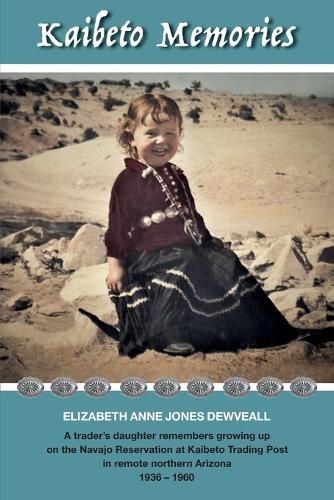Readings Newsletter
Become a Readings Member to make your shopping experience even easier.
Sign in or sign up for free!
You’re not far away from qualifying for FREE standard shipping within Australia
You’ve qualified for FREE standard shipping within Australia
The cart is loading…






This title is printed to order. This book may have been self-published. If so, we cannot guarantee the quality of the content. In the main most books will have gone through the editing process however some may not. We therefore suggest that you be aware of this before ordering this book. If in doubt check either the author or publisher’s details as we are unable to accept any returns unless they are faulty. Please contact us if you have any questions.
Kaibeto Memories
ELIZABETH ANNE JONES DEWVEALL
A trader's daughter remembers growing up
on the Navajo Reservation at Kaibeto Trading Post
in remote northern Arizona
1936 - 1960
TRADERS TO THE NAVAJO
RALPH AND JULIA JONES, parents of author Elizabeth Anne Jones
Dewveall, operated the Kaibeto Trading Post on the Navajo Reservation for
28 years, from 1934 to 1962, in remote northern Arizona. Theirs was a time
when roads in the area were more like paths in the sand, over rocky ridges-
-snow-covered in winter, and across washes that could and did become
flash floods without warning. The
Native population was transitioning
from horseback and wagon travel
to pickups. The post's role was to
provide goods that were needed by
the local population to supplement
the meager resources this harsh
land could provide. Canned fruits
and meats were important articles,
as were tobacco, knives, and
ammunition. The Natives traded
sheep hides, wool, woven blankets,
and turquoise-laden silver jewelry for
goods from the post. Their jewelry
often was provided as collateral,
"pawn", to pay for purchases. Ralph
and Julia and daughter Elizabeth Anne were often the only people of their
"white-person" race in the entire region.
It was in this environment that this book's author Elizabeth Anne lived
her childhood years. Her playmates were often from the local population.
In her later childhood years her school times were spent in distant Leupp
or Winslow, Arizona, but coming back to what she calls, affectionately it is
believed, the "Rez" for holidays and summer vacations.
Told as an adult in the year 2020 while living at Mesa, Arizona, Elizabeth
Anne points out her purpose in recording her story is more for it to be
her parents' story, for there is scant recorded material about their lives at
Kaibeto Trading Post and how they operated this out-of-the-way and nowhistoric
post for many years as a life-hub for a receptive Native population.
$9.00 standard shipping within Australia
FREE standard shipping within Australia for orders over $100.00
Express & International shipping calculated at checkout
This title is printed to order. This book may have been self-published. If so, we cannot guarantee the quality of the content. In the main most books will have gone through the editing process however some may not. We therefore suggest that you be aware of this before ordering this book. If in doubt check either the author or publisher’s details as we are unable to accept any returns unless they are faulty. Please contact us if you have any questions.
Kaibeto Memories
ELIZABETH ANNE JONES DEWVEALL
A trader's daughter remembers growing up
on the Navajo Reservation at Kaibeto Trading Post
in remote northern Arizona
1936 - 1960
TRADERS TO THE NAVAJO
RALPH AND JULIA JONES, parents of author Elizabeth Anne Jones
Dewveall, operated the Kaibeto Trading Post on the Navajo Reservation for
28 years, from 1934 to 1962, in remote northern Arizona. Theirs was a time
when roads in the area were more like paths in the sand, over rocky ridges-
-snow-covered in winter, and across washes that could and did become
flash floods without warning. The
Native population was transitioning
from horseback and wagon travel
to pickups. The post's role was to
provide goods that were needed by
the local population to supplement
the meager resources this harsh
land could provide. Canned fruits
and meats were important articles,
as were tobacco, knives, and
ammunition. The Natives traded
sheep hides, wool, woven blankets,
and turquoise-laden silver jewelry for
goods from the post. Their jewelry
often was provided as collateral,
"pawn", to pay for purchases. Ralph
and Julia and daughter Elizabeth Anne were often the only people of their
"white-person" race in the entire region.
It was in this environment that this book's author Elizabeth Anne lived
her childhood years. Her playmates were often from the local population.
In her later childhood years her school times were spent in distant Leupp
or Winslow, Arizona, but coming back to what she calls, affectionately it is
believed, the "Rez" for holidays and summer vacations.
Told as an adult in the year 2020 while living at Mesa, Arizona, Elizabeth
Anne points out her purpose in recording her story is more for it to be
her parents' story, for there is scant recorded material about their lives at
Kaibeto Trading Post and how they operated this out-of-the-way and nowhistoric
post for many years as a life-hub for a receptive Native population.